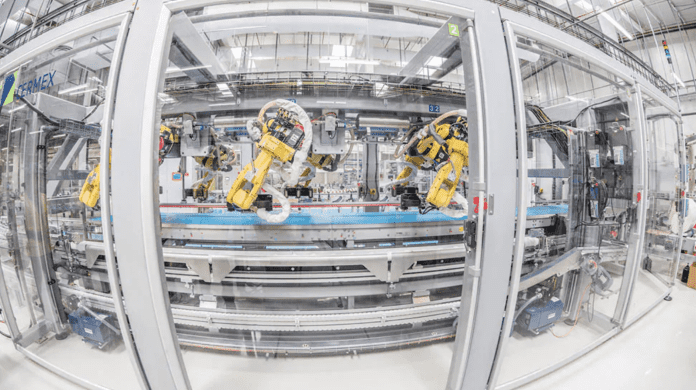Ten new manufacturing sites have joined the World Economic Forum’s ‘global lighthouse network’ of Industry 4.0 leaders. It takes the total number of smart factories in the network to 54. The new joiners include factories owned by Alibaba, Unilever, Renault, Saudi Aramco, and Schneider Electric, among others. The lighthouse list positions the world’s smartest factories as an “engine of the ‘great reset’”, according to its authors.
Four of the new factories are located in Asia, three are in Europe, two are in North America, and one is in the Middle East. It means Asia now contributes around 46 percent to the network, Europe contributes about a third (33 percent), the Middle East and North America contribute just under 10 percent each, and Latin America contributes 3.7 percent, with just under two entries.
The network is assessed and compiled on behalf of the World Economic Forum (WEF) by McKinsey & Company, and rates companies’ factory sites for their application of Industry 4.0 technologies; two intakes are scheduled each year. The latest intake is the first in the COVID-19 era, and the WEF said the assorted manufacturers have found ways to improve sustainability, competitiveness, and customer satisfaction, even in the circumstances.
Francisco Betti, head of advanced manufacturing and production at WEF, said: “Recent world events have led to unprecedented disruptions, affecting nearly every aspect of global industry. Lighthouses demonstrate how Fourth Industrial Revolution technologies can drive efficiency in operations, enhance supply chain resilience and improve customer experience, while augmenting the workforce and enabling more sustainable production systems. They have the opportunity and responsibility to become the engine of the ‘great reset’.”
Enno de Boer, partner and global lead in manufacturing at McKinsey & Company, said: “Now that we are entering the next normal, we have an opportunity for these technologies to enable a great reset in manufacturing and supply chain operations, delivering value to a wide range of stakeholders including workers, consumers, and the natural environment in the shape of the four durable shifts identified in our research.”
Assessment is based on agility and customer centricity, supply chain resilience, speed and productivity, and eco-efficiency. The network is presented as a “platform to develop, replicate and scale up innovation… [and] cross-company learning and collaboration, and for setting new benchmarks for the global manufacturing community.”
The new joiners are listed below, with descriptions in each case by McKinsey & Company.
ASIA
Alibaba (Hangzhou)
“Combining powerful digital technologies with consumer insights, Alibaba’s pilot Xunxi factory brings a fully digitized new manufacturing model to life. It empowers end-to-end, on-demand production based on consumer needs, and enables small businesses to be competitive in the fast-paced fashion and apparel market by shortening delivery time by 75%, reducing the need to hold inventory by 30% and even cutting water consumption by 50%.”
Micron Technology (Taichung)
“To drive the next wave of productivity improvement, Micron’s high-volume advanced semiconductor memory manufacturing facility developed an integrated internet of things and analytics platform, ensuring that manufacturing anomalies can be identified in real time while providing automated root-cause analysis to accelerate new product ramp-up by 20%, reduce unplanned downtime by 30% and improve labour productivity by 20%.”
Midea Group (Guangzhou)
“Faced with intense appliance industry competition and increasing complexity and speed in e-commerce, Midea leveraged Fourth Industrial Revolution technologies to transform from an automated factory to an end-to-end connected value chain, improving labour efficiency by 28%, reducing unit cost by 14% and shortening order lead time by 56%.”
Unilever (Hefei)
“With e-commerce booming in China, Unilever built a pull-production model by deploying Fourth Industrial Revolution solutions such as flexible automation and artificial intelligence at scale across production, warehousing and delivery, reducing order-to-delivery lead time by 50% and e-commerce consumer complaints by 30% while reducing costs by 34%.”
EUROPE
Groupe Renault (Maubeuge)
“To protect the plant competitiveness (recognized as the best-performing light commercial vehicle plant in the Alliance), Groupe Renault deployed Fourth Industrial Revolution technologies at scale in its 50-year-old plant, reducing warranty incidents by 50%, increasing its flexibility to deal with the many vehicle configurations and reducing manufacturing costs by 16%.”
Janssen, Johnson & Johnson (Cork)
“With a fast-changing and increasing demand for biological products, Janssen has digitally connected R&D, its internal and external manufacturing, and deployed advanced process control solutions to drive near real-time visibility of supply chain status, improve reliability by 50%, as well as accelerate technology transfers while reducing costs by 20%.”
Novo Nordisk (Hillerød)
“Facing volume growth and rising complexities, Novo Nordisk has invested in digitalization, automation and advanced analytics, building a robust Industrial Internet of Things operating system to be scaled across their manufacturing footprint, increasing equipment efficiency and productivity by 30%.”
MIDDLE EAST
Saudi Aramco (Khurais)
“As part of Aramco’s dedication to increase the resiliency of its operations, the Khurais oil field was built as a fully connected and intelligent field, with over 40,000 sensors covering over 500 oil wells spread over 150km x 40km. This enabled autonomous process control, remote operation and monitoring of equipment and pipelines, resulting in maximizing the oil well production with at least 15% attributed to smart well completion technology alone.”
NORTH AMERICA
DCP Midstream (Denver)
“Driven by the need to combat market volatility with operational transformation and innovative efficiencies, DCP Midstream leveraged internally developed digital solutions and tech-venture partnerships to integrate the remote control of operations with its planning, logistics and commercial systems, allowing real-time optimization of margins and creating over $50 million in value.”
Schneider Electric (Lexington)
“To maintain a business and technological edge, Schneider Electric’s more than 60-year-old facility has implemented Fourth Industrial Revolution technologies to achieve a complete end-to-end transformation of its operations from supplier to customer. This has improved customer satisfaction by 20%, demand forecast accuracy by 20%, and reduced energy costs by 26%.”

